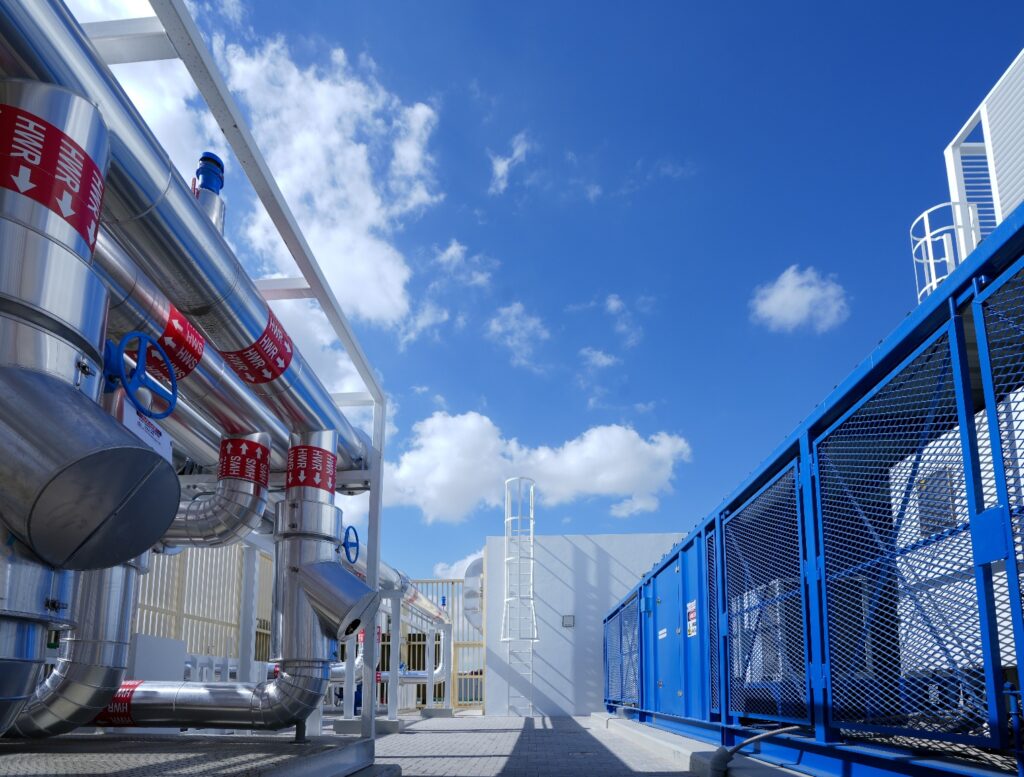
A few months ago, the two companies announced a breakthrough for the planned geothermal cooling project with the successful well testing of the two geothermal wells, with temperatures exceeding 90 oC and flow rates of approximately 100 L/s. The doublet now provides hot water that is fed into absorption cooling technology to produce chilled water, which is then utilized for Tabreed’s district cooling activities.
The two geothermal wells being utilized for the project had been drilled way back in 2009 to 2010 under a project that had been done with Reykjavik Geothermal. Advancements in geothermal and district cooling technologies, as well as development at Masdar City, compelled the partners to revisit the project.
The project is enabled by ADNOC’s initial $15 billion (AED 55 billion) allocation towards low carbon solutions and will support its decarbonization plan and net zero goals by 2045. The cooling plant will further decarbonize the way buildings are cooled in Masdar City while diversifying the UAE’s energy mix in support of the UAE National Energy Strategy 2050.
The cooling of buildings accounts for up to 70% of the UAE’s electricity consumption. District cooling offers a sustainable alternative to traditional cooling methods as it is around 50% more energy efficient in its standard operations. Integrating geothermal energy within district cooling operations can significantly reduce electricity demand for cooling from the grid.
“This project is the latest in ADNOC’s strategy to develop and deploy technologies that will help our company and country to decarbonize. For the very first time, we have tapped into the abundance of clean underground thermal energy available here in the UAE,” said Musabbeh Al Kaabi, ADNOC Executive Director for Low Carbon Solutions and International Growth.
“Early efficiency performance from the G2COOL plant has surpassed our expectations, proving that geothermal energy is a viable way to decarbonize the way we cool buildings, which is one of the most energy intensive activities in our region. I look forward to working with partners and pioneers to find fresh ways of harnessing this underground heat to further support ADNOC’s accelerated decarbonization plan and net zero by 2045 ambition.”
Khaled Al Qubaisi, Tabreed Chairman, added: “As our country welcomes the world for COP28, Tabreed is proud to announce such promising results from the Gulf region’s first geothermal energy project. This pioneering pilot project has confirmed that geothermal provides a viable, renewable source of clean energy that can support district cooling across the UAE. Our partnership with ADNOC on geothermal shows what can be achieved through a shared commitment to progress.”
“Cooling more sustainably is one of Masdar City’s greatest challenges. Producing the equivalent of 10% of our district cooling needs using geothermal energy is an enormous leap on our journey achieving net-zero. We are delighted to work with Tabreed and ADNOC on this project to create a more sustainable future together,” further said Ahmed Baghoum, CEO of Masdar City.
Building on the success of the G2COOL plant, ADNOC is also working with several companies to maximize the contribution of geothermal energy in the UAE using the latest drilling and power generation technologies.